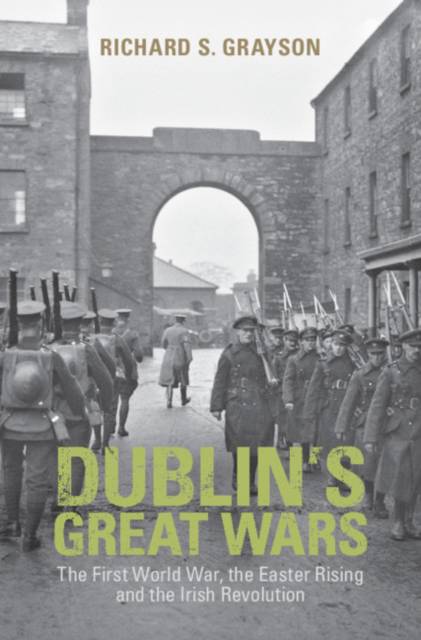
Door een staking bij bpost kan je online bestelling op dit moment iets langer onderweg zijn dan voorzien. Dringend iets nodig? Onze winkels ontvangen jou met open armen!
- Afhalen na 1 uur in een winkel met voorraad
- Gratis thuislevering in België vanaf € 30
- Ruim aanbod met 7 miljoen producten
Door een staking bij bpost kan je online bestelling op dit moment iets langer onderweg zijn dan voorzien. Dringend iets nodig? Onze winkels ontvangen jou met open armen!
- Afhalen na 1 uur in een winkel met voorraad
- Gratis thuislevering in België vanaf € 30
- Ruim aanbod met 7 miljoen producten
Zoeken
Dublin's Great Wars
The First World War, the Easter Rising and the Irish Revolution
Richard S Grayson
Hardcover | Engels
€ 40,95
+ 81 punten
Omschrijving
For the first time, Richard S. Grayson tells the story of the Dubliners who served in the British military and in republican forces during the First World War and the Irish Revolution as a series of interconnected 'Great Wars'. He charts the full scope of Dubliners' military service, far beyond the well-known Dublin 'Pals', with as many as 35,000 serving and over 6,500 dead, from the Irish Sea to the Middle East and beyond. Linking two conflicts usually narrated as separate stories, he shows how Irish nationalist support for Britain going to war in 1914 can only be understood in the context of the political fight for Home Rule and why so many Dubliners were hostile to the Easter Rising. He examines Dublin loyalism and how the War of Independence and the Civil War would be shaped by the militarisation of Irish society and the earlier experiences of veterans of the British army.
Specificaties
Betrokkenen
- Auteur(s):
- Uitgeverij:
Inhoud
- Aantal bladzijden:
- 484
- Taal:
- Engels
Eigenschappen
- Productcode (EAN):
- 9781107029255
- Verschijningsdatum:
- 23/08/2018
- Uitvoering:
- Hardcover
- Formaat:
- Genaaid
- Afmetingen:
- 164 mm x 234 mm
- Gewicht:
- 898 g

Alleen bij Standaard Boekhandel
+ 81 punten op je klantenkaart van Standaard Boekhandel
Beoordelingen
We publiceren alleen reviews die voldoen aan de voorwaarden voor reviews. Bekijk onze voorwaarden voor reviews.











